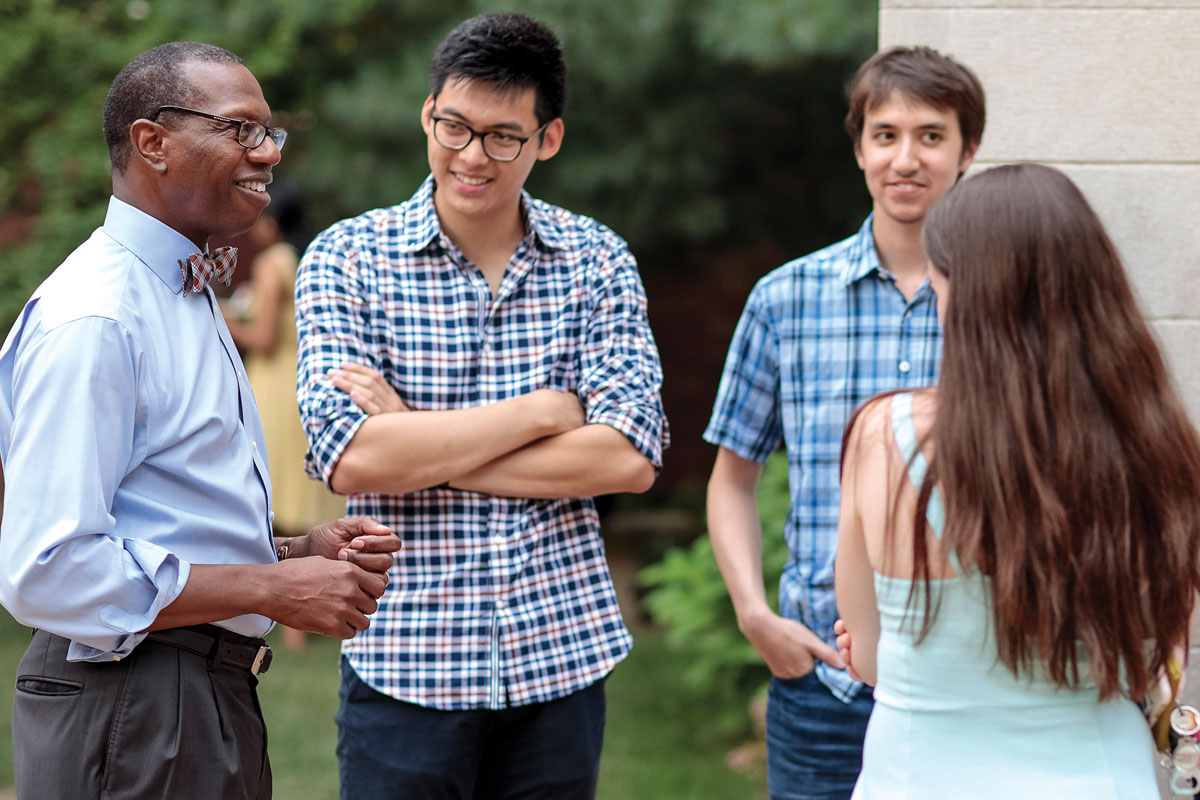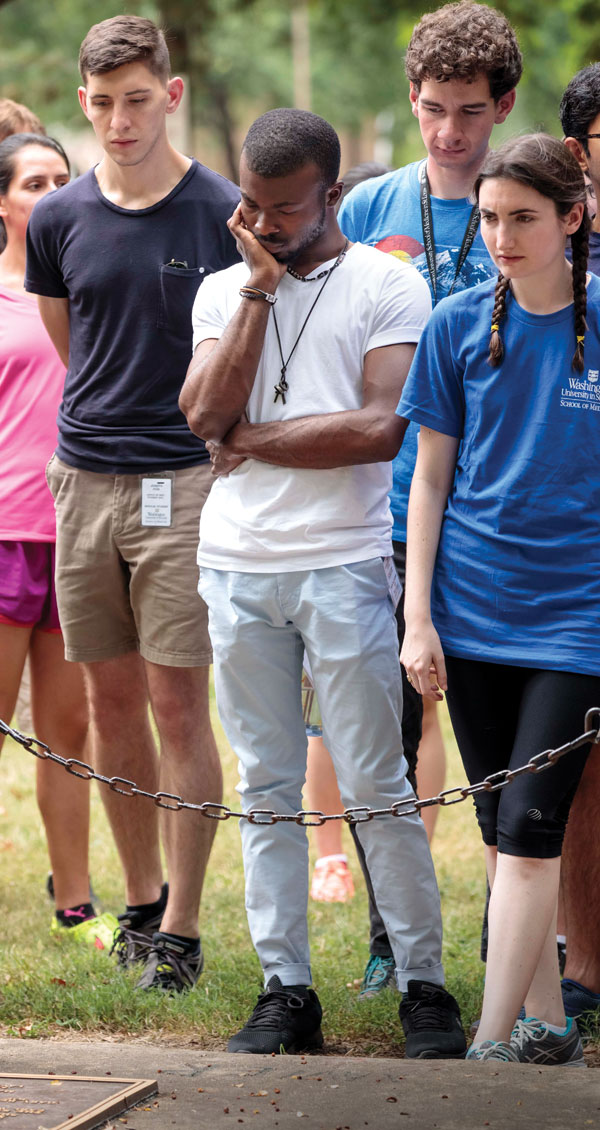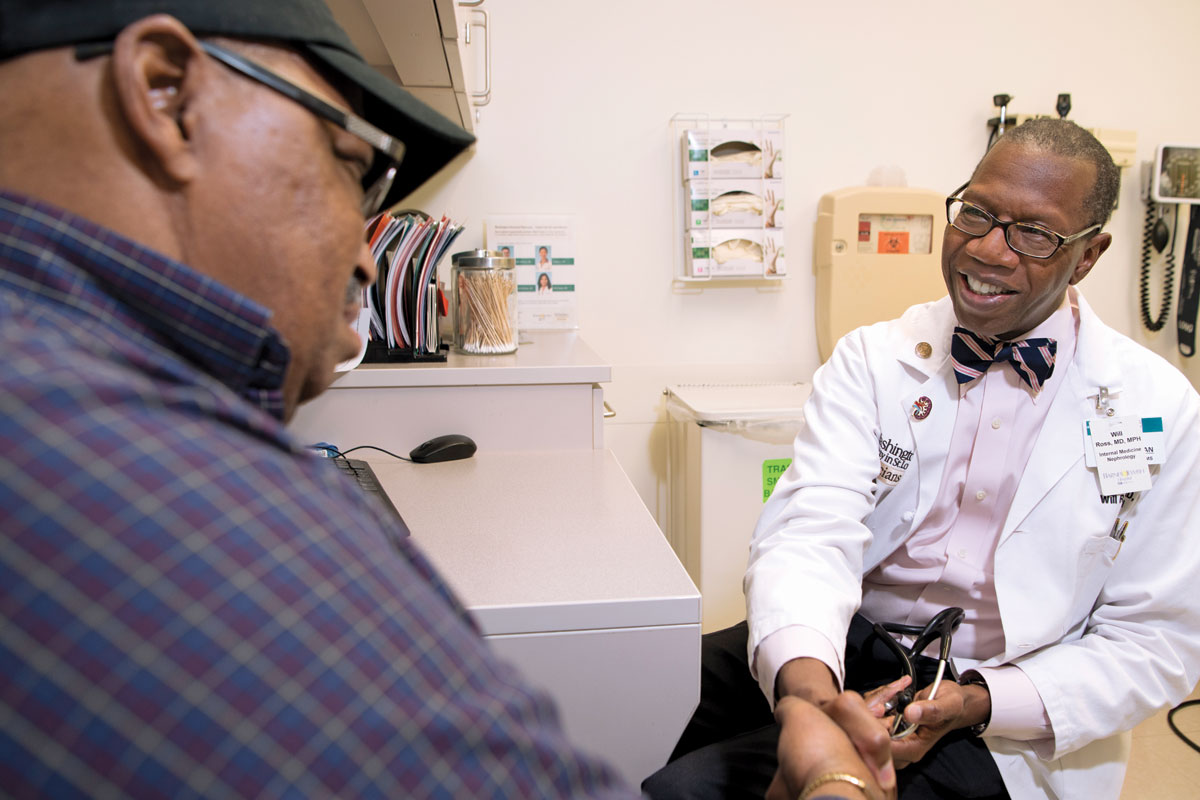Will Ross knows he should be dead. Before his teen years, he had been beaten and bloodied countless times and stabbed in the arm. He had witnessed an execution-style murder and had watched riots burn his community.
He had hidden in his house to avoid gangs. Indoors, he often buried himself in books to escape the alcohol-fueled fighting between his mother and her boyfriends.
“We were the poorest of the poor,” Ross said. “However, my experiences with violence were not unique. Most of the kids I knew growing up are dead or in jail. It is not hyperbole to say I should be dead.”
Now an esteemed nephrologist at the School of Medicine, Ross, MD, MPH, has achieved a level of success that he had never imagined as a boy scrounging for food and wearing ill-fitting hand-me-downs and fearing that rats would crawl over him in his sleep.

Ross could easily ignore people living in communities like the ones of his childhood. But he won’t. His early experiences inspire him as a physician, a professor of medicine and as associate dean of diversity. Long before buzzwords such as “health equity” emerged in the medical field, Ross was teaching how health outcomes are compromised by race, gender, sexual orientation, income, housing, education and other factors.
Through collaborations with local health agencies, Ross has initiated dozens of programs aimed at providing medical care to those who cannot afford it and at improving community resources necessary for good health, such as transportation to a health clinic or access to fresh fruits and vegetables.
“Humanity is lacking in neighborhoods like the one I grew up in,” Ross said. “I understand the social and economic barriers and the anger rooted in the violence. As physicians, we must be aware of such obstacles to health care.”
“Humanity is lacking in neighborhoods like the one I grew up in … . As physicians, we must be aware of such obstacles to health care.”
Ross has ingrained these core principles of understanding and treating underserved patients into the medical school curriculum. He founded the Saturday Neighborhood Health Clinic for the sick and uninsured. More than 90 percent of Washington University medical students volunteer and gain practical, hands-on experience at the federally qualified, no-cost clinic. With faculty supervision, the students treat about 300 patients annually for ailments such as diabetes, asthma, high blood pressure and sexually transmitted diseases.
“Regardless of medical specialty interests, all students benefit from learning about public health, and not just from a clinical perspective,” Ross said. “It teaches compassion and empathy. This is part of our moral responsibility as a medical school.”
The same year Ross founded the Saturday Neighborhood Health Clinic — in 1996 — he also became the associate dean for diversity.
“Will Ross is empathetic, enthusiastic and brilliant, and as associate dean for diversity, he has been nothing short of phenomenal,” said William Peck, MD, the Alan A. and Edith L. Wolff Distinguished Professor of Medicine and co-director of the Center for Health Economics and Policy.
Peck, who served for 14 years as executive vice chancellor and dean of the medical school, recruited Ross to the position.
“I knew right away that he was the person for the job,” Peck said. “Dr. Ross seems laid back, but he isn’t. He is strategic and determined in his trailblazing efforts. He has helped to transform public health care in St. Louis, the state, the country and the world, all while elevating Washington University in diversity and medical education.”
 WHITNEY CURTIS
WHITNEY CURTISPlunging into reality
Ross’s influence on every student is visible beginning Day One. He created a mandatory, four-day orientation program for incoming medical students that includes a diversity retreat, lectures in health disparities and tours of St. Louis’ poorest, most racially segregated nonwhite neighborhoods. Called Washington University Medical Plunge, the course removes students from academic and clinical settings and immerses them into the realities facing underprivileged patients.
On the tour, students see abandoned and dilapidated homes, weedy parks where feral dogs roam and a lack of basic services such as markets with healthy food.
“It defines the abstract,” Ross said. “There’s no sugar-coating. Some of the students have never witnessed poverty before the tour. It’s important to broaden their outlook because they may one day treat patients in similar circumstances.”
The tour leaves many students teary-eyed and emotionally altered. “It had a major impact on me professionally,” said surgical resident Leisha Elmore, MD ’13, MPHS. “I found my love for serving underprivileged communities because of Dr. Ross.”
Similarly, many Washington University students have said they chose the School of Medicine specifically because of Ross, who is known for keeping his office door open and spontaneously inviting them to his house, where he and nurse anesthetist Arlene Moore, his wife of nearly 30 years, raised two daughters. Both daughters are now adults dedicated to social justice.
Ross is noted for his calm demeanor and dapper clothing choices. He received his first bowtie for Easter when he was 4 years old. It’s a fond memory that has contributed to a collection of 50 bowties.
 WHITNEY CURTIS
WHITNEY CURTISAt first glance, Ayodamola Otun, a first-year medical student from Nigeria, said he wondered if the distinguished professor with the bowtie would have time for him. “I thought Dr. Ross wouldn’t be interested in me because he had lived in privilege long enough to forget about people like me. But I shared my personal challenges.
“It is hard to explain but the way he listened and responded showed me he cared. I felt safe and reassured that he was the right mentor, and Washington University was the right place,” he said.
Ross’s drive to improve medicine for the poor extends beyond his leadership in St. Louis. He has assisted in establishing health-care programs in Ethiopia and South Africa. Currently, in Haiti, Ross is helping to develop a university undergraduate program in public health. In the U.S., he has worked with the Centers for Disease Control and Prevention and other agencies to promote cultural awareness among physicians and reduce minority obstacles to health care. Through the Association of American Medical Colleges (AAMC), Ross advocates for increased diversity among faculty and students.
“Dr. Ross’s work sits at the nexus of academic medicine and public health,” said Juan Amador, the AAMC’s director of constituent engagement. “He is a national leader in this area.”
A 2016 AAMC report attributed at least 40 percent of negative patient outcomes to health disparities caused by social and economic factors. Such inequities, the report stated, may cause “systematic, measurable and avoidable health differences between populations that stem from social factors such as racism, poverty, lack of healthful food, and homophobia that result in disproportionate disease and death for the poor, racial and ethnic minorities, persons living with disabilities, LGBT communities and others.”
“Will Ross spoke about these issues when I first met him decades ago,” said William Danforth, chancellor of Washington University from 1971 to 1995. “He was compassionate and authoritative, and I remember thinking, ‘Gosh, that young man really knows what he’s talking about.’ ”
Hiding from the violence
Ross knows because he lived it. Rarely has he spoken publically about his traumatic childhood. However, he has decided to share his experiences, hoping others will be inspired to persevere to achieve their goals.
Ross’s journey began in a shotgun shack with four older siblings, his grandmother and his mother in the small, segregated town of Helena, Ark. “I was born into a traumatic situation,” Ross recalled. “My mother’s boyfriend didn’t like me. My mother had mental health issues and was not there for me. I never knew my father. However, my grandmother, Willie Page, loved me unconditionally and, without doubt, was the biggest influence of my life.”
As a toddler, Ross’s family moved 90 miles north to Memphis to hide from his mother’s abusive boyfriend.
“My first memories were of violence,” Ross said. “I remember watching people hurt each other and not knowing what to say or how to process it.”
He aimed for inconspicuousness to avoid violent interactions. But he was lanky and wore big glasses, and his awkwardness and vulnerability grabbed attention. Ross fell prey to the older kids who assaulted him with rocks and bottles.
He devoured books from the library. He relished mathematical equations like other kids enjoyed sports. In kindergarten, he had his first memorable experience with medicine.
Ross’s sister, Helen, 6, had severe asthma exacerbated by their mother’s cigarettes. One night when the siblings were unsupervised, Helen could barely breathe. Ross and his other sister, Sherry, 8, helped walk Helen four blocks to an emergency room. Once they arrived, health-care workers groused, glared and ignored them.
“Will someone please take care of my sister?” the young Will Ross demanded. “She can’t breathe.”
“If you don’t like it,” a physician told the children, “leave.”
They didn’t, and eventually Helen was treated. But Ross never forgot the experience. “I was 5 years old and as serious as I’ve ever been,” Ross said. “I told myself that if I ever became a doctor, I would never treat a patient so unkindly and disrespectfully as the staff had treated us. We were kids. We didn’t want Helen to die.”
Collectively, Ross’s neighborhood experienced its lowest point on April 4, 1968. For months prior, African-American sanitation workers had been on strike to protest economic and social injustices. Trash overflowed into the streets. An odor of human waste and rotten food prevailed. Flies buzzed in swarms.
“Still, we had glimmers of hope,” Ross said. That’s because Martin Luther King Jr. had come to Memphis to support the sanitation workers. “He spoke of civil rights,” Ross added. “He was leading us toward a better life.”
However, shortly after 6 p.m., avowed racist James Earl Ray assassinated King at the Lorraine Motel, two blocks from Ross’s neighborhood. “I remember my mother crying, neighbors crying,” Ross said. “I was shattered. We all were.”
For many, grief turned to anger. “Some people were armed and rioting,” he said. “They began destroying non-black businesses. They burned down our neighborhood market run by Chinese-American immigrants. Their daughter, Shirley, was my friend. We did mathematical equations at the store. After the market was destroyed, I never saw her again. I have no idea what happened to the family.”
Ross sighed heavily, gazed at the ground and shook his head in disappointment. “Another tragic outcome is that the neighborhood never recovered,” he said. “To this day, it still looks bombed out.”
 TIM PARKER
TIM PARKERA safe passage
Ross’s future shifted one afternoon. With blood on his shirt — a result of a beating by gang members —he visited the high school guidance counselor.
The counselor pointed Ross toward Shirley and Alfred Wexner, who had established a scholarship fund in their deceased daughter’s honor for underprivileged kids with academic promise.
Shirley Wexner helped Ross attend a summer program at Phillips Exeter Academy, an elite boarding school in New Hampshire. This exposed him to higher-level coursework and opportunities at elite colleges. Ross lived with the Wexners periodically in Memphis, usually during the harshest moments at his home.
“The Wexner family offered me a safe passage,” Ross said. “In all likelihood, I would be dead if the Wexners hadn’t intervened.”
Like many students in the Exeter program, Ross was accepted into top-tier universities. He received a full-ride scholarship to Yale University, where he earned a degree in biology in 1980, and then to Washington University, where he earned a medical degree in 1984.
Throughout, the Wexner family provided financial and emotional support. “We love him,” said Shirley Wexner’s daughter, Barrie, who is slightly older than Ross. “We are proud he continues to help people in need.”
Encounters with racism
Despite the Wexners’ support, Ross had to overcome race-based obstacles. As a second-year medical student, Ross was interrogated, handcuffed and thrashed against a car hood. Police believed he had robbed a store for no reason other than his skin color. An hour later, Ross was released when a white classmate vouched that he had been in class when the robbery occurred.
The incident that most stands out occurred in 1985, when Ross was an internal medicine resident at a hospital affiliated with Vanderbilt University in Nashville.
“Around 2 a.m., a middle-age white man came into the emergency room with an inflamed knee,” Ross recalled. “I told him I needed to drain the pus. He said he refused to be treated by a ‘nigger doctor.’ Those were his words. I took a deep breath and told myself to rise above and take the moral high ground.
“I said, ‘Sir, my name is Dr. Ross. I’m your doctor. I’m not a nigger. I will be the person who treats you. But first, you owe me an apology.’ ”
The man apologized. In the years ahead, Ross would stand up to countless more racist acts.
“I feel there aren’t that many ‘bad’ people; rather, there are those who have been socialized to think or act a certain way,” Ross said. “Speaking out and showing them the damage done by their sometimes unintentional words or deeds can be insightful and even therapeutic, as they realize all of us have unconscious biases.”
Ross continued: “As associate dean for diversity, I feel I should give voice to those who feel dispossessed but are either afraid to speak out or don’t know how.
“By speaking out, we improve health care and we uplift humanity.”